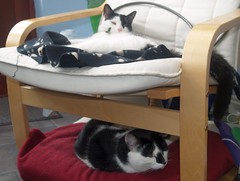Carrying on my posts about chapters in this excellent book:
Ch 10 PennTags at the University of Pennsylvania.
Laurie Allen & Marcella Barnhart
“PennTags is a social bookmarking tool for locating, organising and sharing online resources” It allows users to assign multiple identities to a single resource and is retrieved when users view a record in the catalogue. It was developed for use by a specific cohort of students and has not yet been offered to the whole academic community, though a new version will be more widely promoted.
Ch 9: Library instruction on the go – podcasting at the Kresge Library.
Jennifer Zimmer and Sally Ziph
Summarises the journey library staff took in developing podcasts and vodcasts to support information literacy. Podcasts are recommended as an additional tool in an IL programme. Includes useful links to resources for podcasting.

Bramley heading out for a walk








